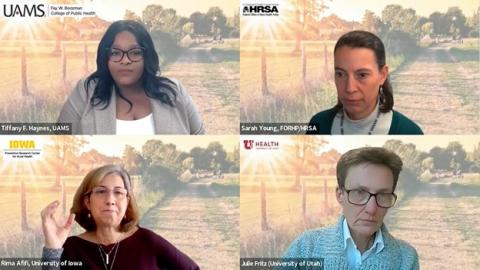Rural Health Seminar Addresses Dissemination, Implementation

NIH recently held the fourth annual Rural Health Day Seminar, “Improving Rural Health Through Research Dissemination and Implementation.”
Dr. Lawrence Tabak, performing the duties of NIH director, opened the seminar by listing several obstacles: higher percentage of older adults, higher poverty rates, less accessible health care providers and facilities and the disproportionate impact of the Covid-19 and opioid misuse epidemics. He noted that the work of all 27 institutes and centers relates to the needs of rural communities, with mental health, health promotion, pain management, obesity, diabetes, hypertension, dental health, eye health and cancer currently representing emphasis areas for researchers interested in rural populations.
Dr. Shannon Zenk, director of the National Institute of Nursing Research, identified the intersection of rurality and social determinants of health as particularly important in successful dissemination and implementation of research findings. To underscore this understanding within NIH, she spotlighted several ongoing NIH efforts—in particular ComPASS (Community Partnerships to Advance Science for Society) and the NIH HEAL (Helping to End Addiction Long-term) Initiative.
The seminar included panelist presentations and discussion, moderated by Sarah Young of the Health Resources and Services Administration’s Federal Office of Rural Health Policy. She discussed the higher rates of all-cause mortality in rural communities and the continued growth of the gap between rural and urban residents—not only for all-cause mortality but also for each of the leading causes of mortality.
Panelists were Dr. Rima Afifi of the University of Iowa College of Public Health, Dr. Julie Fritz of the University of Utah College of Health, and Dr. Tiffany Haynes of the University of Arkansas for Medical Sciences.
Afifi proposed reimagining rurality to shift the prevailing understanding away from the status quo, which she described as metronormative, urban-centric, monolithic, minimalist and deficit-based.
Fritz outlined the foundational principles for her community partnerships and implementation efforts: shared goals, shared resources, shared data and mutual respect for expertise.
Haynes shared the impetus for her research: conversations with community members, such as a pastor from the Arkansas Delta, which has the highest percentage of rural residents and African-American residents in the state, about his congregation’s struggles with depression and suicide. These talks resulted in the REJOICE intervention, which Haynes’s team co-created with community members in response to the notable imbalance of need for and access to health services.
Audience questions covered a range of topics, including ways in which rurality intersects with bias and prejudice; strategies for outreach, participation and engagement; and the intentional use of language. Panelists emphasized the importance of sustaining the work, connections and relationships in the community; and understanding the unique needs of individual communities.
Concluding the seminar, Dr. Monica Webb Hooper, deputy director of the National Institute on Minority Health and Health Disparities (NIMHD), synthesized the myriad themes addressed. She reflected on the progress achieved while acknowledging the severity of the disparities between urban and rural health outcomes, and the relationship of those worsening disparities with adverse social factors that combine to negatively impact health.
Webb Hooper tasked researchers to continue creating and cultivating meritorious science projects to address rural health challenges, noting that NIMHD has a history of encouraging and funding paradigm-shifting research.
For more on the seminar, visit https://bit.ly/3WElVgu. To watch the recorded videocast, go to https://bit.ly/3H7y6fU.
